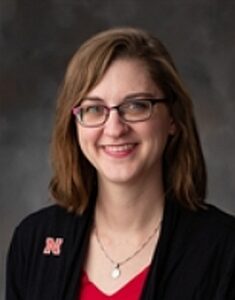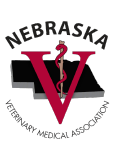The NVMA Board of Directors is pleased to present the following two candidates for consideration of Secretary/Treasurer for the 2023 calendar year. Voting will be done electronically for 2023. Current members must login to your profile to access the ballot.
Officer Elections

Dr. Anna Fitzwater
Senior Clinical Veterinarian
University of Nebraska – Lincoln
Tell us about Dr. Anna Fitzwater
I’m a Nebraska native. I grew up on a cow/calf operation and was one of those kids who always wanted to be a veterinarian. I obtained a BS in Animal Science from UNL and DVM through the UNL/ISU Professional Program in Veterinary Medicine. After graduation, I was an associate veterinarian in companion animal general practice in Lincoln for 5 years. In 2020, I switched gears and am now a laboratory animal veterinarian back at UNL, working on everything from mice to cattle. What I love most about my role is that I get to use my skills as a veterinarian to help ensure the welfare of animals in research, and to support science that makes people and animals’ lives better.
Outside of my work life, I live with my husband, Ben, and 4 year old daughter Ellie, building up our home outside of Lincoln. Ben owns an agricultural technology company, and Ellie owns us. We have two herdless herding breed dogs, a not fully known number of chickens, and a single drake that has lived six years and counting on ad lib layer feed.
What would you like to see for the future of the NVMA?
We need to maintain our legislative presence to protect veterinary medicine, small businesses, and animal welfare in our state.
I would like reflect on some of the changes the COVID-19 pandemic brought to our world and continue the work of applying them to the NVMA. Many people found online CE to be a useful alternative to in person due to a variety of challenges of physical attendance. However, we also learned not to take for granted the value of face to face time together. I am excited for the upcoming summer conference in Deadwood and thinking big for CE meetings. I’d also like to explore “thinking small” and offering mini-conferences across the state for connection and CE hours, with less travel and time away for local vets and techs.
Dissatisfied clientele is nothing new to the veterinary profession. However, the rise of “keyboard warriors” poses threats to veterinary professionals’ reputations, well-being, and even personal safety. These attacks have risen in the social media era and show no sign of going away. The AVMA has created good general resources. The NVMA could potentially build on these to provide Nebraska veterinary professionals with quickly accessible guidance tailored to our state laws and local resources.
Why should your colleagues in veterinary medicine support organized veterinary medicine?
There is strength in numbers. As veterinary professionals, we have many diverse perspectives, but we also have a core devotion to animals, their welfare, and the connecting health and welfare of the humans and environment they interact with. If we do not have a seat at the table where decisions are made, somebody else will make them for us. Those folks will not share the same understanding of what affects veterinary medicine and all the ways our work is vital to society as a whole.
What unique qualities do you possess that would make you an outstanding NVMA leader?
I am a type of person who tends to gather information and seek out different perspectives in an effort to find common ground and common sense solutions.
What do you hope to gain by being on the leadership team of the NVMA?
I hope to make lasting connections with veterinary professionals across the state and help keep the NVMA vital and relevant for Nebraska veterinary professionals.

Dr. Kassie Wessendorf
Veterinary Technician Instructor
Northeast Community College
Tell us about Dr. Kassie Wessendorf
I started my veterinary career as an animal care technician (like a veterinary technician) in the US Army Reserves. I spent 8 years in the Reserves and had the privilege of working with animals in the United States as well as in places like El Salvador and Afghanistan, while getting my undergraduate degree from UNL. I graduated from UNL/ISU vet school in 2014. After graduation, I worked in a mixed animal practice with locations in Pierce and Norfolk, NE with a predominant interest in small animal medicine. I started as an adjunct instructor for Northeast Community College in 2018 and started working at Northeast full time in 2020 in the Veterinary Technician Program teaching students to become veterinary technicians. I teach a variety of courses from large animal nursing labs to companion animal and exotic animal nursing care to clinical pathology to veterinary office practices. I live on a small acreage by Foster, NE with my husband and three stepsons. We have a small flock of chickens, a rabbit, chinchillas, and a few dogs.
What would you like to see for the future of the NVMA?
I would love to see some of the younger veterinary professionals, especially veterinary technicians, be more involved in the NVMA. There are a lot of issues facing the veterinary profession right now and we need people to be more involved to come up with creative ways to solve some of the problems.
Why should your colleagues in veterinary medicine support organized veterinary medicine?
Organized veterinary medicine is important because it gives us a voice with more power behind it. Organizations like the NVMA can reach out to lawmakers, state boards, colleges and universities, and other organizations, and state our opinions and make people aware of the issues we face and where we stand on certain things. There is a power in organized veterinary medicine that the individual person lacks and that is numbers. The more veterinary professionals we have in our organization, the louder our voice can be and the more improvements we can achieve.
What unique qualities do you possess that would make you an outstanding NVMA leader?
With my past experience in the military, I understand the process it can take to create change within a group. That being said, patience and determination are what create change and I have both of those qualities. With my position at Northeast Community College, I have contacts in several areas including education, veterinary clinics, producer groups, and veterinary technician groups and have an idea of what is important to each group and the challenges they face. This allows for some unique perspective on how the veterinary profession relates to more groups of people than just veterinarians and veterinary technicians.
What do you hope to gain by being on the leadership team of the NVMA?
By being on the leadership of the NVMA, I hope to gain an avenue to educate people on challenges the veterinary profession faces and hope to create ways to alleviate some of those challenges, be it the shortage of veterinarians and veterinary technicians, mental health issues our profession faces, or other issues.

